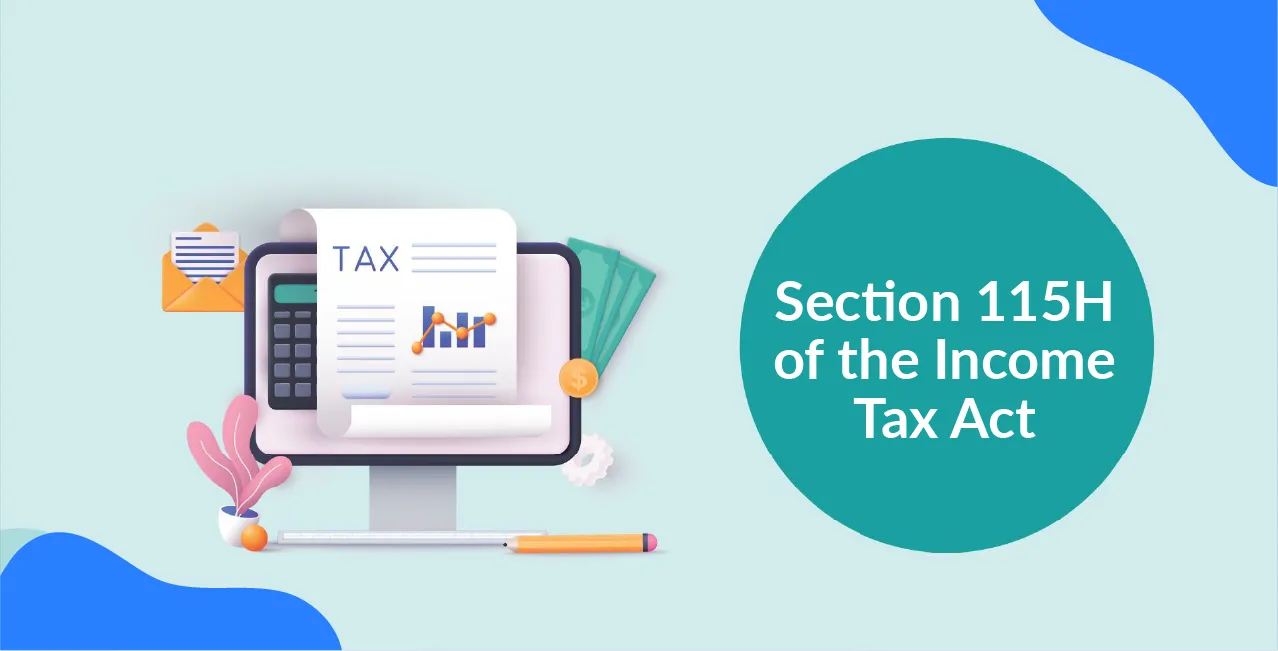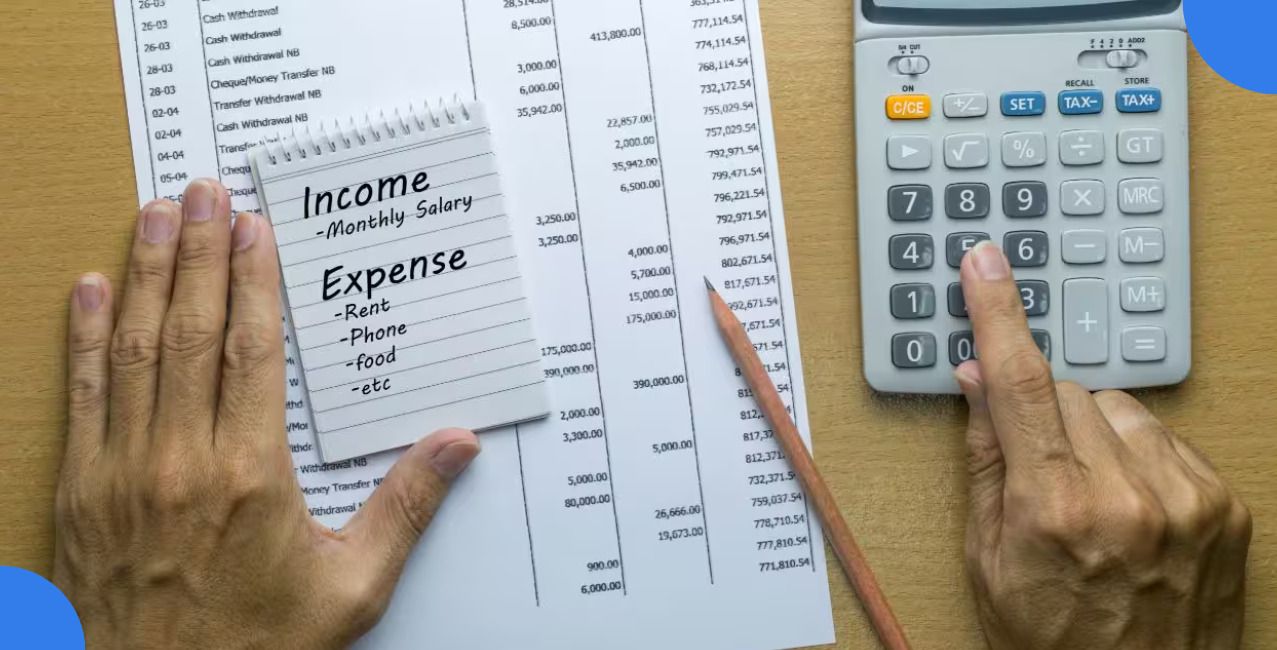Section 115H of the Income Tax Act – Benefits for NRIs Explained

Check Your Loan Eligibility Now
By continuing, you agree to LoansJagat's Credit Report Terms of Use, Terms and Conditions, Privacy Policy, and authorize contact via Call, SMS, Email, or WhatsApp
Karan spent most of his life living in a foreign country, but came back to India. He has a small amount of money (₹50,000) in a foreign bank. He is concerned about taxes on that money. This is where section 115 H assists individuals such as Karan.
Who can use Section 115H?
- An Indian citizen who was a non-resident but is now a resident of India.
- They must have foreign income (like interest from a foreign bank).
What does it do?
- Allows Karan to avoid double taxation (paying tax in both countries).
- Let him file taxes in India as if he were still a non-resident for that income.
Example:
By doing so, Karan saves money and gets out of confusion.
Importance of Section 115H
Karan, who has just returned to India after some years in a foreign job, has his savings in another bank in a foreign country. He gets interested in such money. In the absence of Section 115H, he would have tax trouble. This part is beneficial to him in numerous aspects.
Why is Section 115H Important?
- Avoids Double Taxation: Karan won’t pay tax twice (once abroad and again in India) on the same income.
- Simplifies Tax Filing: He can declare his foreign income in India without extra tax if it was already taxed abroad.
- Helps Returning Indians: People like Karan, who were non-residents but are now residents, get relief.
- Encourages Savings Abroad: Karan doesn’t need to rush to transfer all his money back to India.
Example:
In this manner, Karan will save money and avoid excess taxes.
Objectives of Section 115H of the Income Tax Act
Karan worked in labour in the USA for 10 years and stored some money at the Bank of the USA. He was concerned about paying taxes in India on his foreign earnings. His section, Section 115H, was designed to assist individuals such as him.
Key Objectives of Section 115H
- Prevent Double Taxation: Ensures Karan doesn’t pay tax in both India and the USA on the same income.
- Ease Transition for Returning Indians: Helps former non-residents (like Karan) adjust to Indian tax rules smoothly.
- Encourage Keeping Foreign Income Abroad: Karan doesn’t have to withdraw his foreign savings just to avoid tax troubles.
- Simplify Tax Compliance: This makes it easier for Karan to report foreign income without complex calculations.
Example:
This is so that Karan retains much of his hard-earned money and does not even worry about taxation.
TDS Rate Under Section 115H
Karan, who has just returned to India after running abroad, still receives interest on fixed deposits he had left with earlier as an NRI. The banks, as a rule, take out TDS (Tax Deducted at Source) on such income. Section 115H provides him a concession on the TDS rate.
Key Points on TDS Under Section 115H
- Lower TDS for Former NRIs: If Karan’s income was earned when he was an NRI, banks deduct TDS at 20% (instead of the normal 30% for residents).
- Applies to Certain Incomes: Mainly for interest from NRI fixed deposits (FDs), bonds, or other investments made while he was abroad.
- No Extra Tax If Already Paid Abroad: If tax was deducted in a foreign country, Karan can avoid double taxation under this section.
Example:
In this manner, Karan will pay reduced taxes on his past NRI investments after relocating to India.
Exemption Under Section 115H
Karan is an NRI and spent 8 years working in Dubai, and had invested his money in Indian fixed deposits. On his re-entry into India, he was concerned about the increased taxes on his NRI investment. As he becomes a resident, Section 115H allows him to retain his NRI tax benefits.
Key Exemptions Under Section 115H
- Continues NRI Tax Benefits: Karan keeps the lower 20% TDS rate on his old NRI deposits instead of the normal 30% for residents
- Avoids Double Taxation: If tax was already paid abroad, no additional tax in India on the same income
- Applies to Past NRI Income: Only covers investments made when Karan was still an NRI, not new investments after returning
Example:
In this manner, Karan will retain more of his Dubai-generated savings even when he re-enters India. The advantage is retained until his NRI investments are doubled.
Due Date and Compliance Requirements
- Karan must file his tax return by July 31 each year if he wants to use Section 115H benefits
- He needs to submit Form 10F to the bank to keep getting 20% TDS on his NRI deposits
- Karan should keep all foreign tax payment proofs in case the tax office asks
- If he misses the deadline, he loses the special NRI tax rates and pays normal resident taxes
- The bank statements showing TDS deductions must be saved for 6 years
Example: The date screened by Karan in his return is before July 31, when he files Form 10F - his bank deducts 20% tax only from his old NRI deposits.
Practical Examples
- NRI Fixed Deposits: Karan's ₹10,00,000 NRI FD earns ₹70,000 interest. With Section 115H, the bank deducts 20% TDS (₹14,000) instead of 30% (₹21,000).
- Foreign Dividends: His US stocks earn ₹50,000. Since he paid 15% tax in the USA, Section 115H prevents double taxation in India.
- Savings Account Interest: His old NRE account earns ₹25,000 in interest. Without Section 115H, full tax applies. With it, zero tax is already taxed abroad.
- Capital Gains: Selling overseas property? Section 115H helps offset foreign taxes against Indian tax dues.
To retain these benefits, Karan just files returns by July 31.
Conclusion
Sections like 115H have made life easier for people like Karan who worked abroad and then returned to India. These rules help stop double taxation on income that was already taxed in another country.
For example, Karan still enjoys a lower tax rate of 20% on his old fixed deposits made as an NRI, instead of the usual 30%. Also, India doesn’t tax the dividends he earns from stocks in the US again.
Karan gets these benefits easily by filing his tax returns on time and submitting Form 10F. This special rule gives fair tax treatment to returning Indians on their foreign income.
FAQs
1. What is Section 115H?
Section 115H helps people like Karan who return to India after working abroad. It lets them keep the lower NRI tax rates on their old foreign income and investments.
2. Who can use Section 115H?
Any Indian citizen who was a non-resident (NRI) and becomes a resident again can use it, but only for the income they earned as an NRI.
3. Does it apply to new income after returning to India?
No, it only covers income from investments or accounts Karan made when he was still an NRI.
4. What tax rate applies to NRI deposits after returning?
Karan’s old NRI fixed deposits will still have 20% TDS (tax deduction) instead of the normal 30% for residents.
5. How to claim benefits under Section 115H?
Karan must file his tax return by July 31 and submit Form 10F to his bank to keep the lower TDS rate.
6. What if Karan misses the tax filing deadline?
He loses the special NRI tax rates and will pay normal resident taxes on his old NRI income.
7. Does Section 115H help avoid double taxation?
Yes! If Karan already paid tax abroad (like on US dividends), he won’t pay full tax again in India.
8. What documents should Karan keep?
Foreign tax receipts, bank statements, and Form 10F for at least 6 years in case the tax office asks.
Other Related Pages | |||
About the author

LoansJagat Team
Contributor‘Simplify Finance for Everyone.’ This is the common goal of our team, as we try to explain any topic with relatable examples. From personal to business finance, managing EMIs to becoming debt-free, we do extensive research on each and every parameter, so you don’t have to. Scroll up and have a look at what 15+ years of experience in the BFSI sector looks like.
Subscribe Now
Related Blog Post

Salaried vs. Self-Employed: Who Gets a Personal Loan Faster in 2025?

Too Many EMIs? What to Do When Monthly Payments Become Unmanageable

Post Office Customer Care Number: Helpline & Support
Recent Blogs
All Topics
Contents
Quick Apply Loan
Consolidate your debts into one easy EMI.
Takes less than 2 minutes. No paperwork.
10 Lakhs+
Trusted Customers
2000 Cr+
Loans Disbursed
4.7/5
Google Reviews
20+
Banks & NBFCs Offers
Other services mentioned in this article





